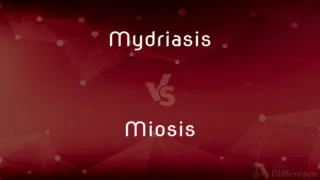Multip vs. Primip — What's the Difference?
Edited by Tayyaba Rehman — By Fiza Rafique — Updated on November 2, 2023
Multip refers to a woman who has given birth more than once, while Primip denotes a woman who is giving birth for the first time.

Difference Between Multip and Primip
Table of Contents
ADVERTISEMENT
Key Differences
In the medical field, particularly obstetrics, the term "Multip" is used to describe a woman who has experienced childbirth more than once. This term acknowledges her experience with previous deliveries. "Primip," short for primipara, refers to a woman who is pregnant for the first time or is giving birth for the first time. The distinction between Multip and Primip is essential in obstetrics as it can impact the management of pregnancy and labor.
Multip is derived from the Latin term "multipara," which means a woman who has borne more than one child. This classification can influence how healthcare providers approach the pregnancy, considering that a Multip may have a broader understanding of the childbirth process from personal experience. Primip, from "primipara," indicates a first-time mother, who may require more guidance and support due to her lack of personal experience with childbirth.
The experience of a Multip in childbirth often translates into different expectations and preparations for labor. They may have a different psychological approach to pregnancy and labor, sometimes more relaxed due to familiarity with the process. On the contrary, a Primip may exhibit more anxiety or have more questions, being unfamiliar with the sensations and processes involved in labor and delivery.
In terms of medical implications, a Multip may face different risks or have a different prognosis in certain situations compared to a Primip. For instance, labor might progress more quickly for a Multip since her body has undergone childbirth before. In contrast, a Primip may have a longer labor, and her healthcare team might be on alert for first-time delivery complications.
Finally, Multip mothers may engage differently with healthcare services, potentially requiring less education about childbirth but possibly more attention to complications arising from previous deliveries. Primip mothers might need more comprehensive prenatal education but may have fewer complications related to past pregnancies since they are experiencing their first.
ADVERTISEMENT
Comparison Chart
Meaning
A woman who has given birth more than once.
A woman giving birth for the first time.
Origin
From Latin "multipara".
From Latin "primipara".
Experience
Has previous childbirth experience.
Lacks personal childbirth experience.
Labor Pattern
May have quicker subsequent labors.
May have a longer first labor.
Medical Focus
Attention to previous birth outcomes.
Focus on education for childbirth.
Compare with Definitions
Multip
A woman with multiple childbirth experiences.
The midwife considered her a multip, anticipating a smoother delivery.
Primip
Someone having no previous childbirth experience.
The primip had many questions about the stages of labor.
Multip
One who has been through labor and delivery more than once.
Her status as a multip informed her birth plan choices.
Primip
A first-time mother in the labor process.
The nurses provided extra support to the primip during her labor.
Multip
A multigravida who has completed two or more pregnancies to the stage of fetal viability.
The doctor noted that the multip had shorter labors historically.
Primip
A female in her first pregnancy that has reached viability.
The primip was excited and nervous for her first birth experience.
Multip
A mother who has delivered more than one child.
As a multip, she felt more prepared for her third labor.
Primip
A woman who is pregnant for the first time.
As a primip, she attended all the prenatal classes available.
Multip
An experienced mother in terms of giving birth.
The Multip shared her birthing tips with the first-time mothers.
Primip
A woman experiencing her first delivery.
Anxiety was common among the primip group in the study.
Multip
A multiparous woman; one who has given birth twice or more.
Primip
A female during her first pregnancy
Primip
A female who has delivered a single offspring
Common Curiosities
Is anxiety more common in Primips?
It can be, due to the unknowns of childbirth.
Why is distinguishing between Multip and Primip important?
It helps tailor prenatal care and labor management.
What is a Primip?
A woman who is giving birth for the first time.
Does being a Multip affect the choice of birth plan?
It might, based on past experiences.
Can a Multip have a faster labor?
Yes, Multip women often have faster subsequent labors.
Do Primips need more prenatal education?
Typically, yes, due to their lack of experience with childbirth.
Can a Primip have a quick labor?
It's possible, though first labors tend to be longer.
Can the terms Multip and Primip apply to men?
No, they are specific to women with respect to childbirth.
What is a Multip?
A woman who has given birth more than once.
Is the term Multip used outside of obstetrics?
It is primarily used in medical contexts.
Is the experience of pregnancy different for Multip and Primip women?
Yes, due to different levels of experience and knowledge about childbirth.
Can a Primip become a Multip?
Yes, if she gives birth more than once.
How does healthcare differ for a Multip vs. a Primip?
Multip may need less education but more monitoring for previous complications, while Primips may need more education.
Are there any emotional differences between Multip and Primip women?
Emotional responses can vary; Multip may be more relaxed, and Primips more anxious.
Are Multip women at higher risk for certain complications?
They may be, depending on their previous childbirth experiences.
Share Your Discovery

Previous Comparison
Mydriasis vs. Miosis
Next Comparison
Rooster vs. RosterAuthor Spotlight
Written by
Fiza RafiqueFiza Rafique is a skilled content writer at AskDifference.com, where she meticulously refines and enhances written pieces. Drawing from her vast editorial expertise, Fiza ensures clarity, accuracy, and precision in every article. Passionate about language, she continually seeks to elevate the quality of content for readers worldwide.
Edited by
Tayyaba RehmanTayyaba Rehman is a distinguished writer, currently serving as a primary contributor to askdifference.com. As a researcher in semantics and etymology, Tayyaba's passion for the complexity of languages and their distinctions has found a perfect home on the platform. Tayyaba delves into the intricacies of language, distinguishing between commonly confused words and phrases, thereby providing clarity for readers worldwide.














































